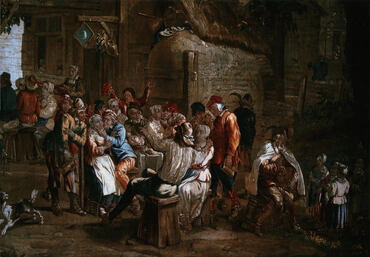Three Feasts
By New Christian Bible Study Staff

The Children of Israel were told to keep three feasts each year - the feast of unleavened bread, the feast of first fruits, and the feast of ingathering. Should we still do that?
In Exodus 23:14-16, Moses receives the instructions about these feasts. Those three verses in Exodus comprise our brief story. Their inner meaning is explained in Arcana Coelestia 9286-9296.
There are three feasts. In the Word, the number three represents a completeness, a sense of things being covered from beginning to end. Our thankfulness to the Lord is supposed to keep going - to endure.
The first feast, of unleavened bread, stands for worship, for our thankfulness for the Lord's action in our minds to get rid of false ideas. That enables us to start to receive good loves.
The second feast, of first fruits, relates to the planting of true ideas in that "soil" of initial loves for doing good.
The third feast, of harvest, or ingathering, stands for the time when, by applying our true ideas, we receive real good - loves of the neighbor and of the Lord - that become the middle of our lives. This is the state of rebirth, where we have - by working through the year (our lives), and enduring in thankfulness, allowed the Lord to get rid of our false ideas, and push our evil loves to the periphery, so that good can work, and be fruitful.
These feasts, then, represent the progress of our spiritual lives. In some manner, we need to keep them.
Feast

There are two kinds of feasts mentioned in the Bible. Some were held to commemorate specific, one-time events, such as the feast Abraham held to celebrate the birth of Isaac. Others are commanded of the people of Israel as annual or repeated events. In general, the one-time feasts represent a conjunction of two spiritual states. We are, for instance, called on to bring our external lives -- what we do and think on a day-to-day basis -- into conjunction with the internal beliefs we hold in the Lord and his desires for good for us. At the times we succeed in doing that, we can experience a sense of joy and fullness that brings to mind a feast. The prescribed feasts represent the joy we can feel in worshiping the Lord -- both in ritual acts of worship and also the worship we offer when we live according to His commandments. These are fitting meanings, both because feasts are joyful and festive and also because of the spiritual meaning of food and drink. Food represents the desire for good, which ultimately comes to us from the Lord. Drink represents the true ideas that help us know what good is and how to act on it. Feasting involves acquiring large quantities of both, which is certainly a joyful thing.






